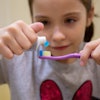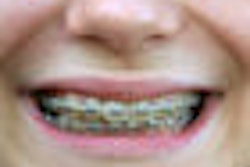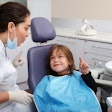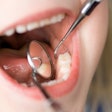
The extent of prolonged thumb sucking -- that is, beyond infancy -- is unknown, but the practice is surely ubiquitous in the U.S. Considering the attempts by parents and dentists to curtail thumb sucking, one would think convincing studies would be available on the long-term effects on dentition and the success of inhibition, as well as its psychological consequences. But few studies extend beyond age 5, and they are limited to teeth alignment.
The consensus among pediatricians and others involved in early childhood development is that one should not interfere or inhibit thumb sucking before age 5, since most children will give it up under peer pressure when they enter school. Thus, there appears to be a trade-off between the undefined psychological trauma of early intervention and the potential for induced malocclusion. The American Association of Pediatric Dentistry and the ADA are less permissive, advocating cessation by age 4.
“Not every prolonged thumb sucker develops an open bite or a
cross bite.”
Thumb sucking -- also known as non-nutritive thumb or finger sucking (NNS) -- that extends beyond age 4 or 5 is probably more of an emotional problem for parents and dentists than for the thumb sucker. For parents, prolonged thumb sucking signifies infantile regression, self-indulgence, and forbidden narcissism. Many dentists are concerned that persistent NNS will cause an anterior open bite of the incisors and a posterior cross-bite of the deciduous molars. But not every prolonged thumb sucker develops an open bite or a cross bite, and, even if they do, the condition may "disappear" if the habit ceases by age 8, give or take a year.
Then there are those children who are ashamed to suck their thumb during school hours, but will resume afterward and at night. And prolonged thumb sucking is not limited to children. The habit may persist into adulthood, as a quick check on the Internet will confirm. But the effect on the dentition is probably due not so much to its persistence as to its vigor. The more vigorously a child sucks on fingers, the more likely an open bite will occur that may also be exacerbated by tongue thrusting to fill in the gap during speech.
NNS research
In the most recent studies of children with prolonged NNS, 12% of those who sucked their thumb until age 3-5 had an open bite, increasing to 27% for children age 5 and older (Journal of the American Dental Association, December 2001, Vol. 132:12, pp. 1685-1693). There is also evidence that some malocclusion in the mixed and adolescent dentition may be attributable to early NNS, even when it ceases before age 5 (Pediatric Dentistry, November/December 2005, Vol. 27:6, pp. 445-450).
Another study of the prevalence of malocclusion in the mixed dentition reported 17% for open bites, some of which close spontaneously (European Journal of Orthodontics, March 2004, Vol. 26:3, pp. 237-244). Only 8% of these children exhibited posterior cross bites. To these conditions can be added excessive overjet and class II molar relationships. However, the overall proportion of mixed dentition children with "great treatment need" was only about 26%. How much of this need is the result of NNS is unclear, but surely it is a contributing factor.
While it might seem logical to stop children from thumb sucking around age 3 or 4, is it possible without physical restraint? The plethora of medieval devices (application of bitter, foul-tasting, anti-finger-licking sticky liquids and sprays; tying on gloves and thumb shields; cementing palatal rakes in the mouth) suggests that not even physical restraint is very successful at this age. Besides, since not all thumb-sucking children develop malocclusions, is it fair they should all be subjected to this trauma? A more reasonable approach is to ignore NNS at this early age and even later if there is no evidence of a developing malocclusion, such as an open bite.
Give them some time
In fact, while there is legitimate concern over NNS persistence past age 5 when the permanent anterior teeth are beginning to erupt, its disruption must be handled with care. Parents should not shame, humiliate, or punish their kids for doing what they likely did themselves as children. But they can talk about it. They can discuss it openly and express their own discomfort. And they can encourage them to do other things with their hands.
So let's give those kids who keep on thumb sucking, with no evidence of impending harm, a little more time to allow the habit to dissipate. And while we're at it, let's cut out the soda pop that is doing more harm to the health and well-being of our children than thumb sucking at its worst.
Copyright © 2010 DrBicuspid.com



















